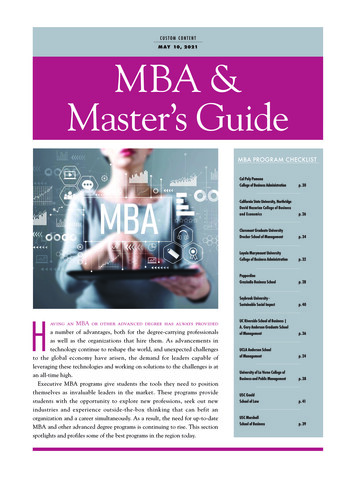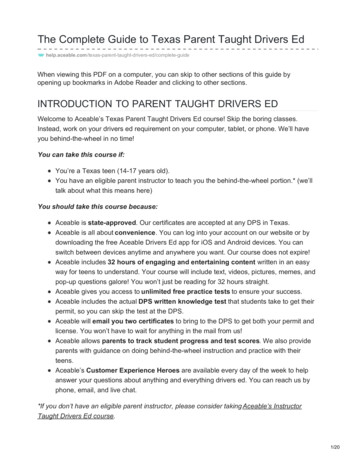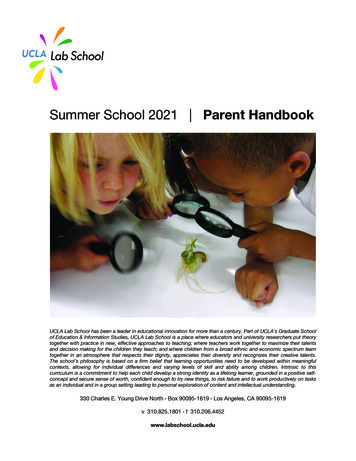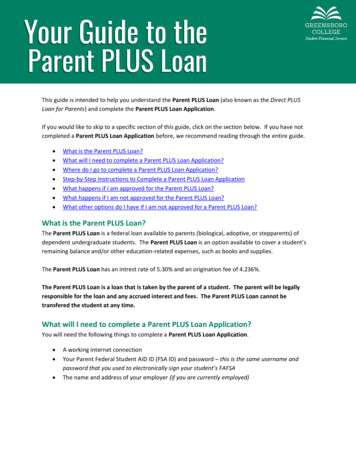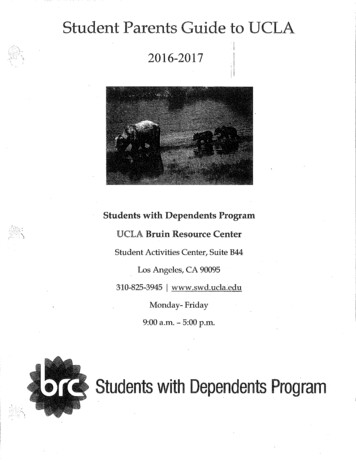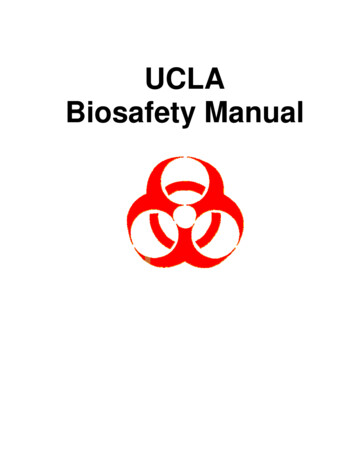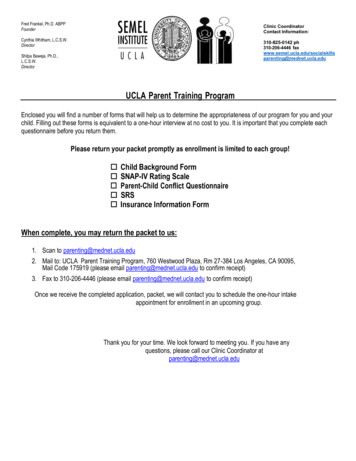
Transcription
Fred Frankel, Ph.D. ABPPFounderClinic CoordinatorContact Information:Cynthia Whitham, L.C.S.W.Director310-825-0142 ph310-206-4446 .ucla.eduShilpa Baweja, Ph.D.,L.C.S.W.DirectorUCLA Parent Training ProgramEnclosed you will find a number of forms that will help us to determine the appropriateness of our program for you and yourchild. Filling out these forms is equivalent to a one-hour interview at no cost to you. It is important that you complete eachquestionnaire before you return them.Please return your packet promptly as enrollment is limited to each group!Child Background FormSNAP-IV Rating ScaleParent-Child Conflict QuestionnaireSRSInsurance Information FormWhen complete, you may return the packet to us:1. Scan to parenting@mednet.ucla.edu2. Mail to: UCLA Parent Training Program, 760 Westwood Plaza, Rm 27-384 Los Angeles, CA 90095,Mail Code 175919 (please email parenting@mednet.ucla.edu to confirm receipt)3. Fax to 310-206-4446 (please email parenting@mednet.ucla.edu to confirm receipt)Once we receive the completed application, packet, we will contact you to schedule the one-hour intakeappointment for enrollment in an upcoming group.Thank you for your time. We look forward to meeting you. If you have anyquestions, please call our Clinic Coordinator atparenting@mednet.ucla.edu
STEWART & LYNDA RESNICKNEUROPSYCHIATRIC HOSPITAL& BEHAVIORAL HEALTH SERVICES AT UCLAChild and Adolescent Psychiatry ClinicBackground Information SheetPatient IdentificationFull Name:Date:Age:Birth Date:Gender://Race/Ethnicity:Place of Birth:WhiteBlackHispanic/LatinoAsian/Pacific IslanderNative AmericanOther:Language Spoken at Home:EnglishOther:Home Address:*Please indicate the best phone number to contactParent/Guardian 1:Name:Home: ()Relationship to Child:Cell: (Age:)Email:Occupation:Parent/Guardian 2:Name:Home: ()Relationship to Child:Cell: (Age:)Email:Occupation:Other (if applicable, i.e. biological parent, step parent):Name:Home: ()Relationship to Child:Cell: (Age:The child lives with:)Email:Occupation:Both Biological/Adoptive ParentsSingle Parent: Please note:Mother orMother and step-fatherFather and step-motherEqual time with separated/divorced parentsOther:FatherCurrent marital status of biological parents:MarriedHow long:SeparatedHow long:DivorcedHow long:OtherDescribe:If parents separated/divorced, who has legal custody in terms of physical/mental healthcare?Is child legally adopted?NoYesIf yes, age at adoption:
STEWART & LYNDA RESNICKNEUROPSYCHIATRIC HOSPITAL& BEHAVIORAL HEALTH SERVICES AT UCLAPatient Identificationeducation (highest level completed):1.2.3.4.5.Parent 1Parent 2Some school but less than completion of high schoolUp to high school diploma or equivalent (GED)Technical/trade school or some collegeCollege graduate or equivalent (B.A., B.S.)Post graduate/Professional degree (M.A., Ph.D., M.D., J.D.)siblings (list names and ages)Full brothers:Full sisters:Half/step siblings:PublicPrivateHomeschooledNot in SchoolName of School:Address:Phone: ( )Teacher:Grade:*If completing during summer break, please indicate grade level for next academic yearHow many years at current school:School HistoryHas your child:1. Had an Individualized Education Plan (IEP)?2. Had a 504 or other accommodations?3. Attended resource, remedial, or special education classes?4. Ever repeated or failed a grade?5. Had difficulty making/keeping friends?6. Had behavioral problems in school?7. Been suspended or expelled from school?What is yourcurrent school performance:FailingBelow AverageAverageAbove AverageCurrentlyIn the PastOther:
STEWART & LYNDA RESNICKNEUROPSYCHIATRIC HOSPITAL& BEHAVIORAL HEALTH SERVICES AT UCLAPatient IdentificationDevelopmental HistoryWhen did your child:Say his/her first words:Put two or more words together:Take his/her first steps:First become toilet trained:Child Mental Health HistoryPlease fill in the relevant diagnoses.AgeWho Diagnosed?Treatment Received?Obsessive Compulsive DisorderTic DisorderAnxiety DisorderAttention Deficit Hyperactivity DisorderDepressionBipolar DisorderEating DisorderAutism Spectrum DisorderMental RetardationPosttraumatic Stress DisorderPsychotic DisorderSubstance AbuseLearning DisorderOppositional Defiant DisorderOther:Has your child ever had thoughts of wanting to hurt himself/herself?Medical History (type and date):Allergies:Significant illnesses:Significant injuries:Significant operations/medical procedures/hospitalizations:YesNo
STEWART & LYNDA RESNICKNEUROPSYCHIATRIC HOSPITAL& BEHAVIORAL HEALTH SERVICES AT UCLAPatient IdentificationChild Medication HistoryMedicationStart DateEnd DateCurrent/Final DoseAny Side Effects?(if applicable)Child History of Psychiatric Hospitalizations:If yes, please describe:HospitalNoAdmission DateHas your child ever had legal problems?NoFamily History of psychiatric / emotional problems:Anxiety DisorderBipolar DisorderAutism Spectrum DisorderPosttraumatic StressLearning DisorderAttention Deficit Hyperactivity DisorderEating DisorderHow Effective?YesDischarge DateYes, please describe:Intellectual-DisabilityPsychotic DisorderDepressionObsessive Compulsive DisorderTourette/Other Tic DisorderSubstance AbuseIntellectual DisabilityOther:
STEWART & LYNDA RESNICKNEUROPSYCHIATRIC HOSPITAL& BEHAVIORAL HEALTH SERVICES AT UCLAPatient IdentificationName:Address:Phone:Does your child have any other doctors or ne:(Signature of Patient, Parent or Legal Guardian)(Printed Name)(Date and Time signed)
Child Name:Completed By:Date:MotherFatherOther:the questions below according to yourbehavior when they are off the medication.SNAP-IV RATING SCALEJames M. Swanson, Ph.DCheck the column which best describes this child:Notat AllJust aLittlePrettyMuch1. Often fails to give close attention to details or makes careless mistakes inschoolwork, work, or other activities2. Often has difficulty sustaining attention in tasks or play activities3. Often does not seem to listen when spoken to directly4. Often does not follow through on instructions and fails to finishschoolwork, chores, or duties in the workplace (not due to oppositionalbehavior or failure to understand instructions)5. Often has difficulty organizing tasks and activities6. Often avoids, dislikes, or has difficulties engaging in tasks that requiresustained mental effort (such as schoolwork or homework)7. Often loses things necessary for tasks or activities ( e.g., schoolassignments, pencils, books, tools, or toys)8. Is often easily distracted by extraneous stimuli9. Often forgetful in daily activities10. Often fidgets with hands or feet, squirms in seat11. Often leaves seat in classroom or in other situations in which remainingseated is expected12. Often runs about or climbs excessively in situations where it isinappropriate13. Often has difficulty playing or engaging in leisure activities quietly14. Istheactsby15. Often talks excessively16. Often blurts out answers to questions before the questions have beencompleted17. Often has difficulty awaiting turn18. Often interrupts or intrudes on othersor games)1.2.3.4.5.6.7.8.Often loses temperOften argues with adultsOften actively defies or refuses adult requests or rulesOften deliberately does things that annoy other peopleOften blames others for his or her mistakes or misbehaviorOften touchy or easily annoyed by othersIs often angry and resentfulIs often spiteful or vindictiveOffice Use Only:Total item ratings Avg rating per item /9/9/8VeryMuch
Child Name:Completed By:Date:MotherFatherOther:PARENT-CHILD CONFLICT QUESTIONNAIREIn order to know how best to help you we need to know how you feel you should relate to your children.This may not be what you are actually doing with your children now. You may find some of thesequestions difficult. Don't be discouraged; just circle the letter next to the one answer that you think is best.1.Suppose Tommy has not been doing his homework, and his mother would like him to. Thefirst thing she might do is:(a) Say, "would you please do your homework now?"(b) Wait until he starts, then help him with it.(c) Tell him, "If you don't do your homework, then you can't go out and play later."(d) Tell him, "It's time to do your homework now", in a neutral tone of voice.2.Mrs. Johnson has told her son Tommy, 8 years old, to stay in the house. Tommy yells at her,heads for the door and comes back while complaining about how "mean" his mother is.What should Mrs. Johnson do?(a) Tell Tommy she loves him.(b) Talk over the problem.(c) Tell Tommy warmly that she likes it when he does what she tells him.(d) Tell Tommy he had no right to yell at her. He should respect his mother more.3.Suppose that Tammy has difficulty getting to school on time in the morning. How could herfather help her best?(a) Frequently remind her to hurry up.(b) Help her with all of her morning tasks each day.(c) Let her know exactly what her morning tasks are, and note which ones she is doingwell.(d) When she is late, tell her "If you'd gotten out of the house sooner, you wouldn't belate for school!"4.Mrs. Johnson want Tommy, age 10, to clean his room each evening. She wants to put up asign to remind him. How can she best write the sign to the job done?(a) "Remember to clean your room!"(b) "Pick up all toys by 8 p.m."(c) "Dirty room means no T.V.!"(d) "No dirty rooms!"5a.Mrs. Johnson has just seen Frank, age 7, hitting his sister, age 4. This is a frequent problemwith Frank and Mrs. Johnson would like to talk to him about it. She should:(a) Pick a time when they are both calm.(b) Start to discuss the problem when they are still fighting, to distract their attention.(c) Wait until Frank's favorite T.V. program is on, turn off the T.V. and talk to Frank.(d) Tell the children that if they calm down, they can discuss the problem with you whileeating ice cream.PARENT-CHILD CONFLICT QUESTIONNAIRE 1
5b.In the above example, when discussing the example of fighting, Mrs. Johnson should:(a) Tell Frank the reasons why he shouldn't fight with his sister.(b) Simply state the problem and ask Frank to help with the solution.(c) Simply state the problem and ask Frank why he does it.(d) Both (a) and (c)6.Tommy is throwing his ball so hard that he may accidentally hurt a child standing nearby.What should his mother do?(a) Walk up next to Tommy and lean towards him.(b) Tell him in a firm tone of voice "I want you to throw that ball away from the otherchildren, please".(c) If he starts to face away from the other children say, "That's right! Throw it safely",in a warm tone of voice.(d) All of the above.(e) Both (a) and (b).7.Suppose you want to have a talk with your 4 year old child about something she does thatfrequently bothers you. You should:(a) Explain to her why what she's doing is wrong, so she'll understand better what theproblem is.(b) Describe the problem to her and how it makes you feel, calmly and briefly.(c) Praise her if she is listening or helping with the solution.(d) Answers (b) and (c) only.8.Mr. Johnson has repeatedly asked Tony, age 10, to feed his pet after school. He does thissometimes. What should Mr. Johnson say after Tony does this?(a) "I really like it when you listen to me!"(b) "That's great! Why couldn't you do that before?"(c) "I really like that. Remember to do it tomorrow!"(d) "I'm really glad you didn't forget this time!"9.Tommy and his sister are teasing each other loudly in the back seat of the car, so that Mrs.Johnson is having trouble driving safely. Which of the following would be the most effectivewarning?(a) After pulling over to the side of the road, she says, "If you are quiet, then we cancontinue riding".(b) "Wait until we get home!"(c) "If you don't stop that, then no T.V. when we get home".(d) After pulling over to the side of the road, she explains how dangerous it is tomisbehave in the car.PARENT-CHILD CONFLICT QUESTIONNAIRE
SRSFor each question, please check the box that best describes your1 Not True2 Sometimes True3 Often Trueover the past 6 months.4 Almost Always True11. Seems much more fidgety in social situations than when alone.2.3. Seems self-confident when interacting with others.4. When under stress, he or she shows rigid or inflexible patterns ofbehavior that seem odd.5.her.6. Would rather be alone than with others.7. Is aware of what others are thinking or feeling.8. Behaves in ways that seem strange or bizarre.9. Clings to adults, seems too dependent on them.10.get the real meaning of aconversation.11. Has good self-confidence.12. Is able to communicate his or her feelings to others.13. Is awkward in turnseem to understand the give-and-take of conversations).14. Is not well coordinated.15.facial expressions.16. Avoids eye contact or has unusual eye contact.17. Recognizes when something is unfair.18. Has difficulty making friends, even when trying his or her best.19. Gets frustrated trying to get ideas across in conversations.20. Shows unusual sensory interests (for example, mouthing or spinningobjects) or strange ways of playing with toys.21.22. Plays appropriately with children his or her age.23. Does not join group activities unless told to do so.24. Has more difficulty than other children with changes in his or herroutine.25.26.27.28.29.30.Offers comfort to others when they are sad.Avoids starting social interactions with peers or adults.Thinks or talks about the same thing over and over.Is regarded by other children as odd or weird.Becomes upset in a situation with lots of things going on.234
131.about it.32. Has good personal hygiene.33. Is socially awkward, even when he or she is trying to be polite.34. Avoids people who want to be emotionally close to him or her.35. Has trouble keeping up with the flow of a normal conversation.36. Has difficulty relating to adults.37. Has difficulty relating to peers.38. Responds appropriately to mood changes in others (for example, when a39.40.41.42.43.44.Has an unusually narrow range of interests.Is imaginative, good at pretending (without losing touch with reality).Wanders aimlessly from one activity to another.Seems overly sensitive to sounds, textures, or smells.Separates easily from caregivers.understand how events relate to one another (cause and effect)the way other children his or her age do.45. Focuses his or her attention to where others are looking or listening.46. Has overly serious facial expressions.47. Is too silly or laughs inappropriately.48. Has a sense of humor, understands jokes.49. Does extremely well at a few tasks, but does not do as well at mostother tasks.50. Has repetitive, odd behaviors such as hand flapping or rocking.51. Has difficulty answering questions directly and ends up talking aroundthe subject.52. Knows when he or she is talking too loud or making too much noise.53. Talks to people with an unusual tone of voice (for example, talks like arobot or like he or she is giving a lecture).54. Seems to react to people as if they are objects.55.space.56. Walks in between two people who are talking.57. Gets teased a lot.58. Concentrates too much on parts of things rather than seeing the wholepicture. For example, if asked to describe what happened in a story, heor she may talk only about the kind of clothes the characters werewearing.59. Is overly suspicious.60.61. Is inflexible, has a hard time changing his or her mind.62. Gives unusual or illogical reasons for doing things.63. Touches others in an unusual way (for example he or she may touchsomeone just to make contact and then walk away without sayinganything).64. Is too tense in social settings.65. Stares or gazes off into space.234
UCLA Parenting &Friendship ProgramINSURANCE INFORMATION FORMWe cannot guarantee our services will be covered by any particular health insurance program. Therefore, it is your responsibi lity toconfirm your own coverage and if necessary obtain pre-authorization for our services. If your insurance company does not cover ourprogram, we offer a self-pay fee of 683.00* for the initial intake appointment.Please complete the form below. When we schedule your initial evaluation at UCLA, we will have our finance department verify yourinsurance coverage.Policy/Member ID/ Certificate #:Employer:Address:Phone #:SELF-PAYSelf-pay fees: 683.00* for intake appointmentPlease reach out to parenting@mednet.ucla.edu for current weekly self-pay fees.Guarantor name: Relationship of guarantor to patient:DOB of guarantor:*All fees may be subject to change without notice.
MRN:Patient Name:NOTICE OF PRIVACY PRACTICESEffective Date: September 23, 2013UNIVERSITY OF CALIFORNIA LOS ANGELES (UCLA)THIS NOTICE DESCRIBES HOW HEALTH INFORMATION ABOUT YOU MAY BE USEDAND DISCLOSED AND HOW YOU CAN GET ACCESS TO THIS INFORMATIONPLEASE REVIEW IT CAREFULLYUCLA HEALTHUCLA Health is one of the health care components of the University of California. TheUniversity of California health care components consist of the UC medical centers, theUC medical groups, clinics and physician offices, the UC schools of medicine andother UC health professions schools engaged in clinical care, the student healthservice areas on some campuses, employee health units on some campuses, and theadministrative and operational units that are part of the health care components of theUniversity of California.OUR PLEDGE REGARDING YOUR HEALTH INFORMATIONUCLA Health is committed to protecting medical, mental health and personal informationabout you (“Health Information”). We are required by law to maintain the privacy of yourHealth Information, provide you information about our legal duties and privacy practices,inform you of your rights and the ways in which we may use Health Information and discloseit to other entities and persons.HOW WE MAY USE AND DISCLOSE HEALTH INFORMATION ABOUT YOUThe following sections describe different ways that we may use and disclose yourH e a l t h Information. Some information, such as certain drug and alcohol information,HIV information, genetic information and mental health information is entitled tospecial restrictions related to its use and disclosure. Not every use or disclosure will belisted. All of the ways we are permitted to use and disclose information, however, will fallwithin one of the following categories. Other uses and disclosures not described in thisNotice will be made only if we have your written authorization.For Treatment.We may use Health Information about you to provide you withmedical and mental health treatment or services. We may disclose Health Information aboutyou to doctors, nurses, technicians, students, or other health system personnel who areinvolved in taking care of you in the health system. For example, a doctor treating you for abroken leg may need to know if you have diabetes because diabetes may slow the healingprocess. A doctor treating you for a mental condition may need to know what medicationsyou are currently taking, because the medications may affect what other medications may beprescribed to you. We may also share Health Information about you with other non- UCLAUCLA Form #50000 Rev. (10/13)Signed Chart CopyPatient CopyPage 1 of 9
MRN:Patient Name:NOTICE OF PRIVACY PRACTICESHealth providers. The disclosure of your Health Information to non-UCLA Health providersmay be done electronically through a health information exchange that allows providersinvolved in your care to access some of your UCLA Health records to coordinate services foryou.For Payment. We may use and disclose Health Information about you so that thetreatment and services you receive at UCLA Health or from other entities, such as anambulance company, may be billed to and payment may be collected from you, aninsurance company or a third party. For example, we may need to give information to yourhealth plan about surgery or therapy you received at UCLA Health so your health plan willpay us or reimburse you for the surgery or therapy. We may also tell your health planabout a proposed treatment to determine whether your plan will pay for the treatment.For Health Care Operations. We may use and disclose Health Information about you forour business operations. For example, your Health Information may be used to reviewthe quality and safety of our services, or for business planning, management andadministrative services. We may contact you about alternative treatment options for you orabout other benefits or services we provide. We may also use and disclose your healthinformation to an outside company that performs services for us such as accreditation, legal,computer or auditing services. These outside companies are called “business associates”and are required by law to keep your Health Information confidential. We may alsodisclose information to doctors, nurses, technicians, medical and other students, andother health system personnel for performance improvement and educational purposes.Appointment Reminders. We may contact you to remind you that you have anappointment at UCLA Health.Fundraising Activities. We may contact you to provide information about UCLA Healthsponsored activities, including fundraising programs and events. We may use contactinformation, such as your name, address and phone number, date of birth, physician name,the outcome of your care, department where you received services and the dates youreceived treatment or services at UCLA Health. You may opt-out of receiving fundraisinginformation for the UCLA Health by contacting us at 1-855-364-6945 or by email atOptOutUCLAHSD@Support.ucla.edu.Hospital Directory. If you are hospitalized, we may include certain limited information aboutyou in the hospital directory. This is so your family, friends and clergy can visit you in thehospital and generally know how you are doing. This information may include your name,location in the hospital, your general condition (e.g., fair, stable, etc.) and your religiousaffiliation. The directory information, except for your religious affiliation, may also bereleased to people who ask for you by name. Your religious affiliation may be given tomembers of the clergy, such as ministers or rabbis, even if they don’t ask for you by name.You have the opportunity to limit the release of directory information by telling UCLA Health atthe time of your hospitalization.UCLA Form #50000 Rev. (10/13)Signed Chart CopyPatient CopyPage 2 of 9
MRN:Patient Name:NOTICE OF PRIVACY PRACTICESOur disclosure of this information about you if you are hospitalized in a psychiatric hospitalwill be more limited.Individuals Involved in Your Care or Payment for Your Care. We may release medicalinformation to anyone involved in your medical care, e.g., a friend, family member,personal representative, or any individual you identify. We may also give information tosomeone who helps pay for your care. We may also tell your family or friends about yourgeneral condition and that you are in the hospital.Disaster Relief Efforts. We may disclose Health Information about you to an entityassisting in a disaster relief effort so that others can be notified about your condition,status and location.Research. The University of California is a research institution. We may disclose HealthInformation about you for research purposes, subject to the confidentiality provisions of stateand federal law. All research projects involving patients or the information about livingpatients conducted by the University of California must be approved through a specialreview process to protect patient safety, welfare and confidentiality.In addition to disclosing Health Information for research, researchers m a y contact patientsregarding their interest in participating in certain research studies. Researchers may onlycontact you if they have been given approval to do so by the special review process. You willonly become a part of one of these research projects if you agree to do so and sign a specificpermission form called an Authorization. When approved through a special review process,other studies may be performed using your Health Information without requiring yourauthorization. These studies will not affect your treatment or welfare, and your HealthInformation will continue to be protected.As Required By Law. We will disclose Health Information about you when required to do soby federal or state law.To Prevent a Serious Threat to Health or Safety. We may use and disclose HealthInformation about you when necessary to prevent or lessen a serious and imminent threatto your health and safety or the health and safety of the public or another person. Anydisclosure would be to someone able to help stop or reduce the threat.Organ and Tissue Donation. If you are an organ donor, we may release your HealthInformation to organizations that obtain, bank or transplant organs, eyes or tissue, asnecessary to facilitate organ or tissue donation and transplantation.Military and Veterans. If you are or were a member of the armed forces, we may releaseHealth Information about you to military command authorities as authorized or required bylaw.Workers' Compensation. We may use or disclose Health Information about you forWorkers' Compensation or similar programs as authorized or required by law. Theseprograms provide benefits for work-related injuries or illness.UCLA Form #50000 Rev. (10/13)Signed Chart CopyPatient CopyPage 3 of 9
MRN:Patient Name:NOTICE OF PRIVACY PRACTICESPublic Health Disclosures. We may disclose Health Information about you for publichealth activities such as:preventing or controlling disease (such as cancer and tuberculosis), injury ordisability;reporting vital events such as births and deaths;reporting child abuse or neglect;reporting adverse events or surveillance related to food, medications or defects orproblems with products;notifying persons of recalls, repairs or replacements of products they may be using;notifying a person who may have been exposed to a disease or may be at risk ofcontracting or spreading a disease or condition;Abuse and Neglect Reporting. We may disclose your Health Information to agovernment authority that is permitted by law to receive reports of abuse, neglect ordomestic violence.Health Oversight Activities. We may disclose Health Information to governmental,licensing, auditing, and accrediting agencies as authorized or required by law.Lawsuits and Other Legal Proceedings. We may disclose Health Information tocourts, attorneys and court employees in the course of conservatorship, writs and certainother judicial or administrative proceedings. We may also disclose Health Information aboutyou in response to a court or administrative order, or in response to a subpoena,discovery request, warrant, or other lawful process.Law Enforcement. If asked to do so by law enforcement, and as authorized or required bylaw, we may release Health Information:To identify or locate a suspect, fugitive, material witness, certain escapees, ormissing person;About a suspected victim of a crime if, under certain limited circumstances, we areunable to obtain the person's agreement;About a death suspected to be the result of criminal conduct;About criminal conduct at UCLA Health; andIn case of a medical emergency, to report a crime; the location of the crime or victims;or the identity, description or location of the person who committed the crime.Coroners, Medical Examiners and Funeral Directors. We may disclose medicalinformation to a coroner or medical examiner. This may be necessary, for example, toidentify a deceased person or determine cause of death. We may also disclose medicalinformation about patients of UCLA Health to funeral directors as necessary to carry outtheir duties.UCLA Form #50000 Rev. (10/13)Signed Chart CopyPatient CopyPage 4 of 9
MRN:Patient Name:NOTICE OF PRIVACY PRACTICESNational Security and Intelligence Activities. As required by law, we may discloseHealth Information about you to authorized federal officials for intelligence,counterintelligence, and other national security activities.Protective Services for the President and Others. As required by law, we may discloseHealth Information about you to authorized federal officials so they may conduct specialinvestigations or provide protection to the President, other authorized persons orforeign heads of state.Inmates. If you are an inmate of a correctional institution or under the custody of lawenforcement officials, we may release Health Information about you to the correctionalinstitution as authorized or required by law.Psychotherapy Notes. Psychotherapy notes means notes recorded (in any medium) bya health care provider who is a mental health professional documenting or analyzing thecontents of conversation during a private counseling session or a group, joint, or familycounseling session and that are separated from the rest of the individual’s medicalrecord.Psychotherapy notes have additional protections under federal law and most uses ordisclosures of psychotherapy require your written authorization.Marketing or Sale of Health Information. Most uses and disclosures of your HealthInformation for marketing purposes or any sale of your Health Information would require yourwritten authorization.OTHER USES AND DISCLOSURES OF HEALTH INFORMATIONOther uses and disclosures of Health Information not covered by this Notice will be madeonly with your written authorization. If you authorize us to use or disclose your HealthInformation, you may revoke that authorization, in writing, at any time. However, therevocation will not be effective for information that we have already used anddisclosed in reliance on the authorization.YOUR RIGHTS REGARDING YOUR HEALTH INFORMATIONYour Health Information is the property of UCLA Health. You have the followingrights regarding the Health Information we maintain about you:Right to Inspect and Copy.With certain exce
Mail to: UCLA Parent Training Program, 760 Westwood Plaza, Rm 27-384 Los Angeles, CA 90095, Mail Code 175919 (please email parenting@mednet.ucla.edu to confirm receipt) 3. Fax to 310-206-4446 (please email parenting@mednet.ucla.edu to confirm receipt) . Eating Disorder Autism Spectrum Disorder Mental Retardation Posttraumatic Stress Disorder .
